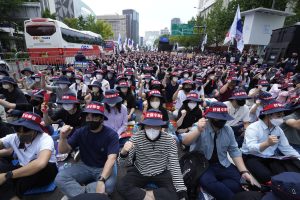Deep political polarization and an underdeveloped party system – coupled with powerful social movements – have been identified as “flawed” aspects of South Korea’s democracy. These factors are, in fact, authoritarian legacies. When democracy is built on indigenous political traditions and pre-existing conditions – such as an authoritarian past – it is bound to take different forms and become “differently democratic.” Authoritarian legacies have lasting effects on people’s attitudes and behavior even decades after a country becomes a democracy. As such, we cannot expect the party system and social movements in South Korea to behave like those in democracies that have not experienced authoritarianism or experienced different forms of authoritarian rule.
Political polarization, divided along generational lines, is a threat to South Korea’s democracy, but it’s also an authoritarian legacy that lives on through those who have been directly and indirectly impacted by the authoritarian past. It is important to understand that it is not just the country’s history of authoritarianism but also people’s varying experiences of authoritarianism that contribute to the workings of – and challenges to – democracy in the country. Just as in South Korea, where understanding generational differences could help illuminate ways of bringing people together, understanding each country’s legacy is key to helping support healthy democracies worldwide.
The State of Democracy in South Korea
Lately, many democracies around the world, including the United States, have been under threat. South Korea, dubbed as one of the most successful “third-wave democracies,” seemed to have defied the global trend of democratic backsliding when in 2016-2017 approximately 15.87 million South Koreans (nearly a third of the country’s population) were involved in a series of peaceful candlelight protests that led to the impeachment of President Park Geun-hye. She was found to be corrupt, unjust, and undemocratic.
The international community praised the movement and South Korea’s vibrant civil society for showing the world “how democracy is done,” as one commentary in the Washington Post put it. However, the fierce counter-mobilization by the far right – who believed that the anti-Park forces were North Korean sympathizers trying to take over the country – revealed deep political polarization plaguing South Korea’s then 30-year-old democracy.
In addition to the political division that surfaced in the protests surrounding Park’s impeachment, the scale and impact of the 2016-2017 Candlelight Revolution affirmed a reoccurring pattern in Korean politics: powerful protest movements – instead of the National Assembly (South Korea’s unicameral legislature) – being the first mover in bringing about major political changes. Other examples include (but are not limited to) the 1960 April Revolution that overthrew Syngman Rhee’s corrupt government, the 1987 June Democratic Uprising that ended authoritarian rule, the 1987 Great Workers Struggle that resulted in labor law reforms, the 1996-1997 Workers’ General Strike that led to yet another amendment of labor laws, and the candlelight protest against the impeachment of President Roh Moo-hyun in 2004, which contributed to the landslide victory of Roh’s Uri Party during the national legislative elections and the dismissal of the impeachment case by the Constitutional Court. Such a pattern arguably reflects the weaknesses of South Korea’s representative democracy, which is marked by a hyperactive civil society and a weakly institutionalized political party system.
































